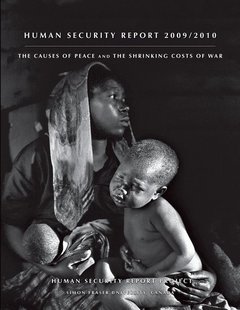Description
Human security report 2009/2010
Author: Report Project Human Security
Language: English
Subjects for Human security report 2009/2010 :
Publication date: 10-2011
128 p. · 20.6x27.5 cm · Paperback
Out of Print
128 p. · 20.6x27.5 cm · Paperback
Out of Print
Description
/li>Biography
/li>
The Human Security Report 2009/2010 argues that long-term trends are reducing the risks of both international and civil wars. The Report, which is funded by the governments of Canada, Norway, Sweden, Switzerland and the United Kingdom and will be published by Oxford University Press, also examines recent developments that suggest the world is becoming a more dangerous place. These include the following: ?Four of the world's five deadliest conflicts?in Iraq, Afghanistan, Pakistan, and Somalia?involve Islamist insurgents. ?Over a quarter of the conflicts that started between 2004 and 2008 have been associated with Islamist political violence. ?In the post-Cold War period a greater percentage of the world 's countries have been involved in wars than at any time since the end of World War II. ?Armed conflict numbers increased by 25 percent from 2003 to 2008 after declining for more than ten years. ?Intercommunal and other conflicts that do not involve a government increased by more than 100 percent from 2007 to 2008. ?The impact of the global economic crisis on developing countries risks generating political instability and increasing the risk of war. ?Wars have become "intractable"?i.e., more difficult to bring to an end.
The Human Security Report Project (HSRP) is an independent research centre affiliated with Simon Fraser University (SFU) in Vancouver, Canada. Formerly located at the University of British Columbia and known as the Human Security Centre, the HSRP joined SFU in May of 2007. The HSRP tracks global and regional trends in organized violence, their causes and consequences. Research findings and analyses are published in the Human Security Report, Human Security Brief series, and the miniAtlas of Human Security. HSRP publications have received major coverage in the international media and are regularly cited by national governments, international agencies, and NGOs, as well as the research community.
© 2024 LAVOISIER S.A.S.
These books may interest you

Barriers to Peace in Civil War 36.76 €

Routledge Handbook of Civil Wars 256.94 €


